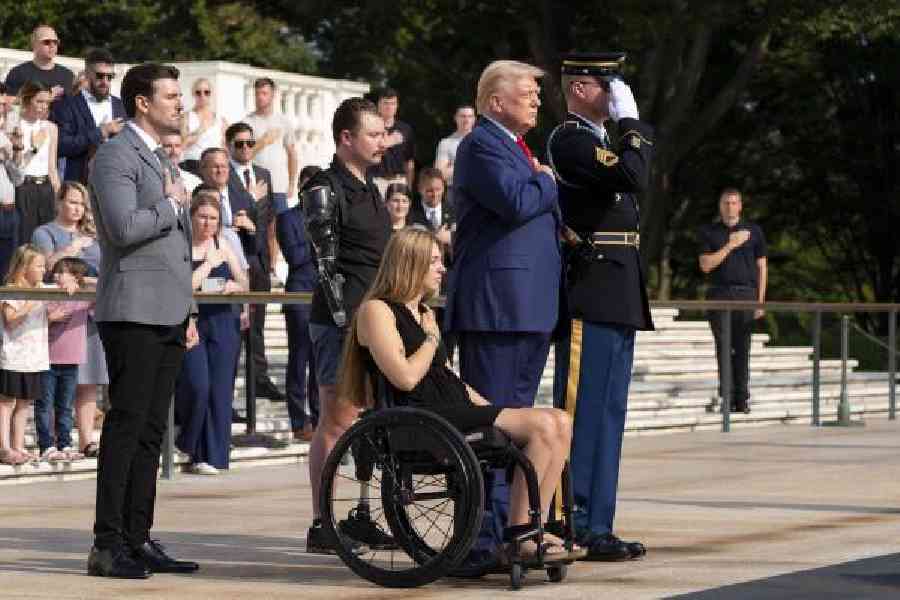In November 1999, Senator John McCain, the Arizona Republican and former prisoner of war in Vietnam who was widely considered a military hero, said that his newly launched presidential campaign had made “a very bad mistake”.
McCain, who at the time was trailing far behind George W. Bush in the race for their party’s nomination, had produced a campaign ad highlighting his career as a navy pilot and his reverence for his fellow service members. At one moment, the ad showed McCain walking solemnly through Arlington National Cemetery.
The army soon said that McCain’s campaign had never requested permission to film in the cemetery. Even if it had, an army spokesman said at the time, the request would have been denied because partisan activity is banned at army installations. A campaign spokesman said that the clip had come from one of the senator’s periodic visits to the graves of his father and his grandfather.
It was an incident in campaign politics that closely mirrored, before it sharply diverged from, another that took place last week. An army spokesman said on Thursday that former President Donald J. Trump’s campaign had similarly not been given permission to film in a restricted area of Arlington National Cemetery during Trump’s visit on Monday — and that it could not have received such permission because it would violate federal law.
The army issued a rare public rebuke of Trump campaign officials for attacks they directed at a cemetery worker who had tried to stop the filming. The Trump campaign had been made aware that filming for campaign purposes was against army regulations — and campaign officials had nonetheless ploughed forward, even, according to the army, physically pushing aside the cemetery worker.
Trump and his campaign published photos and video of the former President laying flowers and flashing a thumbs-up at the graves of Marines killed during the withdrawal from Afghanistan three years ago. Other graves are visible in the footage, including one of a Green Beret who died by suicide. The images are still online.
In McCain’s case, by contrast, the senator quickly moved to cut the cemetery footage — a two-second clip in which no particular grave is visible — from his campaign ad just days after the army issued its statement. McCain said it was “stupidity” that his campaign had not acted even sooner.
The Trump campaign’s response to the most recent incident reflects Trump’s characteristic flouting of political norms, including those regarding veterans and military service that many consider sacrosanct. Early in Trump’s 2016 campaign, he suggested that McCain himself was not a war hero because he had been shot down over Vietnam and had become a prisoner of war. (“I like people who weren’t captured,” he said.) Trump received five draft deferments during the Vietnam War — one for a diagnosis of bone spurs in his heels that led to a medical exemption.
Trump has continued to attract criticism for his remarks about veterans and their families. He belittled the parents of a slain Muslim soldier who had spoken at the Democratic National Convention in 2016. The next year, he told the widow of a soldier killed in Niger that her husband “knew what he signed up for”. In 2020, he speculated that veterans and their families visiting the White House had infected him with the coronavirus.
Last year, John F. Kelly, Trump’s onetime chief of staff, confirmed reports that Trump had privately referred to US troops killed in combat as “losers” and “suckers”. Trump, however, denied Kelly’s claim.
Peter D. Feaver, a political science professor at Duke University who has written extensively on civil-military relations, said that the traditional separation between the military and partisan politics has always been under tension, but that he could not recall an incident like that described by the army last week, in which a presidential campaign was told by the army that it was violating the law, pushed ahead anyway and then levelled insults after the incident became public.
“It is not uncommon that a politician drags the military into a partisan moment,” Feaver said. “What is unusual in this instance is how the Trump team reacted when they were called out for it. Instead of apologising or claiming it was all a misunderstanding, they doubled down.”
New York Times News Service










